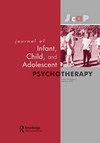Moral Development in Young Children Exposed to Domestic Violence: The Case for the Proactive Role of the Therapist
Q3 Psychology
Journal of Infant, Child, and Adolescent Psychotherapy
Pub Date : 2021-10-02
DOI:10.1080/15289168.2021.2003683
引用次数: 2
Abstract
ABSTRACT Ample evidence shows that exposure of young children to domestic violence may endanger children’s social-emotional development. Yet limited attention has been devoted to ways of specifically addressing issues of moral development in therapy. We highlight the need to address the potential harmful effects of domestic violence on the child’s moral development, within the context of the child’s relationship with the non-offending parent. We suggest that therapists assume a proactive role in identifying and addressing both the child’s and custodial caregiver’s feelings, perceptions and values relevant to the immoral acts of the perpetrator caregiver. Proactively addressing potential distortions seems essential, even though such a purportedly judgmental position may arouse uneasiness amongst therapists. Reviewing cases from Child-Parent-Psychotherapy with families exposed to domestic violence, we identify six recurring themes, indicating risk to children’s moral development. Themes include identification with the aggressor, positive feelings toward the perpetrator leading to excusing the violent acts, ambivalence toward the observance of social rules, and difficulties with empathy, guilt, and remorse. Together with the enlisted support of the custodial caregiver, these provide opportunities for the therapist to clarify and repair moral perceptions and feelings, denoting a clear moral stance, thereby contributing to the prevention of intergenerational cycles of violence.遭受家庭暴力的幼儿的道德发展:心理治疗师的积极作用
大量证据表明,幼儿暴露在家庭暴力环境中可能危害儿童的社会情感发展。然而,对治疗中道德发展问题的具体解决方法的关注有限。我们强调有必要在儿童与无过错的父母的关系范围内处理家庭暴力对儿童道德发展的潜在有害影响。我们建议治疗师在识别和解决儿童和监护照顾者与肇事者照顾者的不道德行为相关的感受、感知和价值观方面发挥积极作用。主动解决潜在的扭曲似乎是必要的,即使这种所谓的判断立场可能会引起治疗师的不安。回顾儿童-父母心理治疗中涉及家庭暴力家庭的案例,我们确定了六个反复出现的主题,表明了儿童道德发展的风险。主题包括对攻击者的认同,对施暴者的积极情感导致对暴力行为的原谅,对遵守社会规则的矛盾心理,以及同情,内疚和悔恨的困难。加上被拘留者的积极支持,这些为治疗师提供了澄清和修复道德观念和感情的机会,表明了明确的道德立场,从而有助于防止代际暴力循环。
本文章由计算机程序翻译,如有差异,请以英文原文为准。
求助全文
约1分钟内获得全文
求助全文
来源期刊

Journal of Infant, Child, and Adolescent Psychotherapy
Psychology-Clinical Psychology
CiteScore
1.70
自引率
0.00%
发文量
37
 求助内容:
求助内容: 应助结果提醒方式:
应助结果提醒方式:


